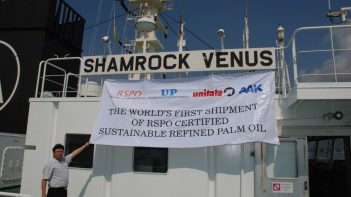New Delhi, India (October 3, 2012) – The Roundtable on Sustainable Palm Oil (RSPO), a global multi-stakeholder organization and an international certification scheme for sustainable palm oil revealed today that critical markets for palm oil, India and China are steadily progressing in their commitment towards certified sustainable palm oil (CSPO). A shift in awareness regarding the direct linkage of conventional palm oil practices and deforestation is picking up as the footprints of companies in India and China in the global arena are growing at a rapid pace.
India is the world’s largest consumer and importer of palm oil with a palm oil footprint of approximately 2 million hectares and imports of over 7.2 million metric tons. China the second largest importer of palm oil in the world, imported around 5.9 million tons in 2011 with a palm oil footprint of approximately 1.5 million hectares.
Commenting on the developments, Darrel Webber, Secretary General RSPO said, “Both power house economies are becoming aware of their increasing responsibility to ensure that the procurement of palm oil comes from responsible sources and are not linked to rainforest and peat land destruction, resulting in climate change. As significant global economies, India and China have immense propensity to influence worldwide advancement of sustainable palm oil.
“From a global reputational point of view, this will carve India and China as an international benchmark on how large and complex economies can commit, assess and assume policies for a mainstream agricultural commodity such as palm oil which is fast gaining sustainable momentum. Through our engagements in these complex and stunningly diverse markets, we are witnessing enthusing levels of affinity and interchange amongst industry players within the palm oil supply chain amongst environmental associations, business communities, food related associations and government agencies.“ Webber further commented.
The RSPO asserts that it is committed to play an active role in the advancement of sustainable pam oil in India and China by focusing on three key aspects.
Firstly; To encourage the role of multinational companies in cascading their global procurement policies and commitment towards sustainable palm oil into India and China. As a case in point: Unilever has announced that by the end of 2012 it will achieve its target of sourcing all palm oil sustainably through Green Palm Certificates, a full three years ahead of its previous schedule that is applicable to India. Unilever has also set a new target for purchasing all of its palm oil from traceable sources by 2020. Similarly, by 2015, the palm oil products Cargill supplies to our customers in Europe, United States, Canada, Australia and New Zealand will be RSPO certified and/or originated from smallholder growers (excluding palm kernel oil products). By 2020, 100 percent of all palm oil products, Cargill will supply to our customers worldwide from across all our oil and trading businesses which will be RSPO certified and/or originated from smallholder growers. Wal-Mart has also pledged to use sustainable palm oil for all of its private brands globally by the end of 2015.
Secondly: To establish awareness and buy-in amongst local companies in India and China on both the commercial and altruistic advantages of their role towards sustainable palm oil, primarily along the supply chain which includes processors & traders; consumer goods manufacturers and retailers. Recently, house hold name in India with extensive international operations, Godrej announced its commitment and intent to procure certified sustainable palm oil and to study procedures for certifying domestically produced palm oil. Subsequently, Ruchi Soya, one of India’s largest palm oil importers, joined RSPO membership along with existing member companies, Adani Wilmar Limited, Kamani Oil Industries Private Limited and VVF Limited, amongst others.
Thirdly: To engage and open channels of communications with Government; relevant Associations; and the civil society in both these markets to establish understanding of the dynamics and priorities within each economic and social landscape; and to weave into that strategic guidelines that embrace sustainable palm oil as key pillar. A recent forum held in Tianjin, China by WWF China; the Consumer Goods Forum; Chinese Chamber of Commerce of Foodstuffs and Native Produce (CFNA) and RSPO on the Sustainable Palm Oil Supply Chain Forum showcased tangible domestic efforts and commitment. The CFNA, a key government influencer, recently released report into the prospects for sustainable palm oil in China. These developments mirror an increasing awareness of sustainability issues amongst Chinese consumers, with a recent survey showing that Chinese consumers’ purchasing behavior is increasingly influenced by a company’s CSR performance.
Latest developments on sustainable palm oil in India and China will be shared at RT10, RSPO’s annual global meeting on sustainable palm oil which will be held from October 20th to November 1st 2012 in Singapore www.rt10.rspo.org.
The RSPO is committed to continuing to build momentum through strategic engagement and collaboration with key stakeholders in both markets. Market transformation in India and China will represent a milestone in RSPO’s efforts to protect high bio-diversity areas, address climate change and deforestation and deal with social issues in producing nations.
—END—
About RSPO
In response to the urgent and pressing global call for sustainably produced palm oil, the Roundtable on Sustainable Palm Oil (RSPO) was formed in 2004 with the objective of promoting the growth and use of sustainable oil palm products through credible global standards and engagement of stakeholders. The seat of the association is in Zurich, Switzerland, while the secretariat is currently based in Kuala Lumpur with a satellite office in Jakarta.
RSPO is a not-for-profit association that unites stakeholders from seven sectors of the palm oil industry – oil palm producers, palm oil processors or traders, consumer goods manufacturers, retailers, banks and investors, environmental or nature conservation NGOs and social or developmental NGOs – to develop and implement global standards for sustainable palm oil.
Such multi-stakeholder representation is mirrored in the governance structure of RSPO such that seats in the Executive Board and project level Working Groups are fairly allocated to each sector. In this way, RSPO lives out the philosophy of the “roundtable” by giving equal rights to each stakeholder group to bring group-specific agendas to the roundtable, facilitating traditionally adversarial stakeholders and business competitors to work together towards a common objective and making decisions by consensus.
For further information, kindly contact:
Contact for RSPO Secretariat:
Anne Gabriel, Communications Director | T: +603 – 2201 2053 5800 | [email protected]
Contact for India:
Arneeta Vasudeva, Sr. Client Services Director | IPAN Hill & Knowlton | T: +91 124 4967 300 | [email protected]
Contact for China:
Jill Peng, Consultant | Hill+Knowlton Strategies | T: + 86 10 5861 0084 | [email protected]
Keep reading

RSPO hosts first Africa downstream sustainable palm oil supply chain forum in Cape Town

Nearly two decades on, Europe continues to drive global demand for RSPO Certified Palm Oil

Communicating Sustainable Palm Oil - examples of success across Europe
[EOT] Terms of Reference: Independent Smallholders Outreach Programme in Indonesia

RT2023 Delegates Propose Solutions to Reinforce RSPO’s Assurance System – End-Year Highlights of Assurance Standing Committee
RSPO UK Members' Day Examines Shifting Dynamics of Doing Business within Europe

Celebrating 20 Years of RSPO’s Sustainability Journey




